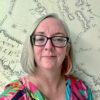The solution to every problem you’ve ever had is written in a self-improvement book somewhere. The critical path to the goal you’re chasing is waiting for you on a bookshelf.
You already know that leaders are readers, and that your success is correlated to how much you read. But what do you do when you’ve read all the classics? Here’s an alternative list of self-improvement books that you may have missed. Many are not shelved in the self-help section, but each will open up new roads into your wide-open future.
Self-Improvement Books About Overcoming the Odds
Success never falls in our lap and always asks a price of us: that we face challenges most mere mortals would avoid. To win, you’ll need to cultivate grit. These books will show you how.
1. Atlas Shrugged
By Ayn Rand
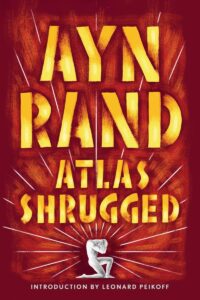
Picture a world where an invisible Destroyer is collapsing the global economy, where factories and railroads are closing, cities are emptying and bands of dangerous gangs roam the countryside.
Now, imagine you’re the book’s heroine, Dagny Taggart, the world’s best hope against the descending dark age, where productive members of society are drained by leeches who control the levers of government and law.
Ayn Rand’s book is full of extreme caricatures and was written as a cautionary tale about communism, but when you’re facing your own incredible odds, invoking Taggart’s indomitable stubbornness will carry you through your own dark ages.
Key takeaways:
- Discover how individual motivation is not selfish but morally imperative.
- Learn the power of ambition and achievement.
Buy this book on Amazon.
2. The Odyssey
By Homer

Any grade schooler knows the Trojan Horse story, but fewer know the sequel: the beleaguered journey home of the Greek soldier, Odysseus. A trip that should take weeks drags out to 10 years as he’s held captive by a magical nymph, shipwrecked and engaged in battle with a giant cyclops. When most of his friends are turned into pigs, you can’t help but feel bad for the guy.
He returns home to find that nobody recognizes him and that a throng of suitors are moving in on his estranged wife. He’ll have to prove his physical prowess to win her back.
The story will inspire you to keep going, but it’s also an invitation to avoid creating enemies as you hustle; if Odysseus hadn’t taunted the cyclops, he could have avoided Poseidon’s fury.
Key takeaways:
- Perseverance in the face of adversity can lead to achievement.
- Temptation can cause distraction.
- Fate versus free will is a struggle we all take on.
Buy this book on Amazon.
3. Jonathan Livingston Seagull
By Richard Bach
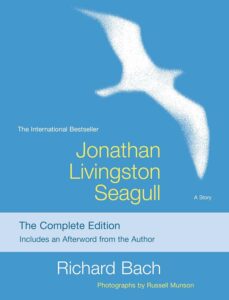
Jonathan Livingston Seagull wants only one thing: to test the limits of seagull flight. Sure, his family and friends flap their wings each day, but to them it’s only a means to food. When the tribe gets fed up with Seagull’s constant barrel-rolls and high-speed near-misses, the elders exile him to the ends of the earth.
What he finds there, and even beyond, is the purity of chasing your purpose even when the whole world is against you. This 144-page book is one to be read often, whenever the “sane” world has you nearly convinced that it would be easier to fall in line than embrace your destiny.
Key takeaways:
- Individualism versus collectivism.
- Breaking with tradition can be challenging but rewarding.
Buy this book on Amazon.
4. Rising Strong
By Brené Brown

Leaving the world of fiction for the ground of rigorous research, here’s a book about how to pick yourself up and thrive when you get knocked down. Brené Brown’s three-step formula is simple:
- Deal with the emotions that follow failure with self-compassion.
- Investigate the false stories you’ve created about this setback.
- Choose a new, empowering attitude that will let you use the broken structure of your failure as the kindling for the blazing fire of your success.
Brown also teaches us to ignore criticism, pointing out that most naysayers don’t have the courage to step into “the arena” themselves. “If you’re not in the arena getting your a** kicked, I’m not interested in your feedback,” she says.
Key takeaways:
- Vulnerability is the first step to personal growth.
- The feeling of discomfort can be evidence of change in our lives.
Buy this book on Amazon.
5. Zen and the Art of Motorcycle Maintenance
By Robert M. Pirsig
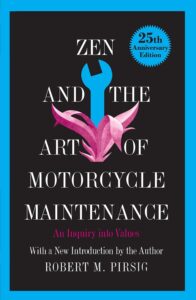
This is a simple story about a man riding west on a motorcycle with his son, but entwined in the narrative are complex philosophical investigations. One explores the concept of “stuckness,” the truism that in anything we do—building a business or a relationship, or fixing a motorcycle—we’ll encounter unexpected and seemingly hopeless problems that stop us cold.
In this trap, we have a choice: rage, or become a blank slate. Choose the latter path, and we can see problems from a new angle, and the solution presents itself. In other words, the obstacle becomes the way.
Key takeaways:
- Perseverance often means changing our mindset.
- Who we are as people does not have to be stagnant.
Buy this book on Amazon.
Best Self-Improvement Books About Following Your Heart
“The only way to do great work is to love what you do,” counseled Steve Jobs. Imagine seeking your own greatness by building someone else’s dream—impossible! Follow Frank Sinatra’s lead, and do it your way.
6. Siddhartha
By Hermann Hesse

Siddhartha is a bright young man born into privilege in ancient India. He rejects the formula for happiness handed to him by his elders and leaves for the wilderness in search of enlightenment.
This story, which parallels Gautama Buddha’s, is as old as history, and one that appears across cultures: a burning sense in our bones that the path others have walked can never be our own. Siddhartha ultimately rejects Buddhism to follow his own path, showing us that even the greatest teacher and the most time-tested formula may not be right for us.
Key takeaways:
- Enlightenment cannot be taught but comes from within.
- Intuition can be instrumental in determining a life path.
Buy this book on Amazon.
7. The Way of the Superior Man
By David Deida
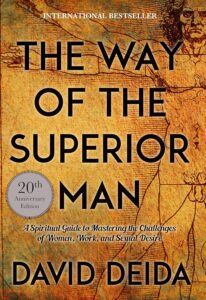
Despite the title, this book contains universal wisdom. Each chapter presents a self-contained lesson, which means you can pick it up and read a section at a time. Some of his advice will make readers uneasy, but that makes it no less true. For example:
- “Live as if your father were dead.” It’s morbid, but who hasn’t at one time sacrificed their own desires to make a parent happy, with miserable results?
- “If you don’t know your purpose, discover it now.” This may seem dead obvious, but how many of us know, and follow, our North Star?
Key takeaways:
- It is important to know your own purpose before entering a relationship.
- Integrity and authenticity will make you more attractive to others.
Buy this book on Amazon.
8. The Universe Has Your Back
By Gabrielle Bernstein
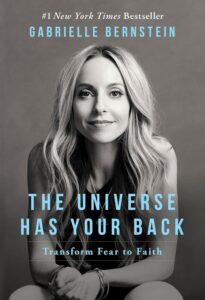
A growing economy and technological improvement continue to deliver material abundance into most of our lives… so why are we so unhappy? This book attempts an answer: We’re spiritually impoverished. (If that makes you uncomfortable, realize that developing a connection to the universe doesn’t require religion.)
In this book, following your heart means quieting your mind long and often enough to hear your heart’s messages, which are always the source of our deepest desires and the path to great self-improvement. Gabrielle Bernstein’s serendipitous anecdotes will inspire you to do just that.
Key takeaways:
- Surrendering control can lead to enlightenment.
- Obstacles can often turn into growth opportunities.
- Living in the present will help you see what’s in front of you.
Buy this book on Amazon.
9. The Surrender Experiment
By Michael Singer
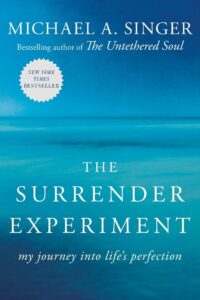
Michael Singer’s memoir starts with his desire as a young man to disappear into the woods and meditate, and ends with his becoming the CEO of the billion-dollar company, WebMD. He tells his story of a series of incredible life adventures, and explains that each was possible only because he surrendered his own will to “life.” In other words, like Jim Carrey in Yes Man, he decided to say yes to whatever opportunity presented itself.
Surrendering your preferences and renouncing goals might seem like the opposite of following your heart, but in fact, it perfectly demonstrates the principle. Singer made following his heart the same as following life’s plan for him, instead of fighting it like most of us do.
Key takeaways:
- A quiet mind can lead to enlightenment.
- You need awareness to see opportunities in front of you.
Buy this book on Amazon.
Best Self-Improvement Books About Leadership
Want to lead others? You’d better learn to lead yourself first. These books will show you how to take control of your thoughts, words and actions so you can become the kind of person who’s capable of building thriving enterprises.
10. The Leader Who Had No Title
By Robin Sharma
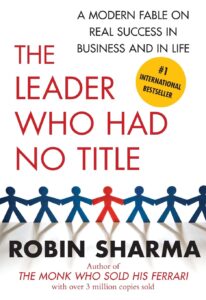
Although one of Robin Sharma’s shorter, lesser known books, it’s one of his most powerful. His storytelling prowess shines through in this simple fable about an average employee who gets a visit from the ultimate leader.
By the end of the book—which you can read in an afternoon—you’ll understand that leadership is not a role, but a mindset that you can apply whether you are a shoeshine boy or emperor of the world.
Fair warning: By the end, you’ll no longer be able to blame others for your situation, feel like a victim or stand idly by while any task goes undone.
Key takeaways:
- Anyone can be a leader.
- There’s much to be gained by lifting others.
- Leaders need to work on themselves before they can help others.
Buy this book on Amazon.
11. The Four Agreements
By Miguel Ruiz
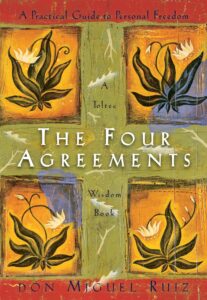
Miguel Ruiz borrows ancient Toltec wisdom to teach us four ultra-simple mindsets that we can adopt in order to become effective leaders. The first agreement is the most powerful: “Be impeccable with your word.”
In plain English: Know that each word out of your mouth (or spoken in your head!) has incredible power to create the reality around you. This means that to be an effective leader of ourselves and others we must jettison negativity and judgment and instead choose words that create confidence, love and inspiration.
Key takeaways:
- Don’t assume the actions of others are a result of something you did.
- Use your words to uplift others.
Buy this book on Amazon.
Self-Improvement Books that Create a Sense of Wonder
What do all successful people have in common? Enthusiasm. Life excites them, and motivates them to get off the couch and do great things. We can create the same drive in ourselves by reading books that remind us how strange and vast the universe is.
12. The Hitchhiker’s Guide to the Galaxy series
By Douglas Adams

Bet you didn’t expect to see a sci-fi comedy on a list of self-help books. This five-book tome will strike you with its pure, joyful imagination. The plot spans the entire, infinite universe, on a timescale spanning well before the construction of planet Earth to moments after the heat death of the universe.
Hard-nosed self-improvement books that preach goals, time management and positive attitudes are invaluable. But take a break from the seriousness once in a while to read farces like this one. It will do two things for you: help you take your work less seriously and kick-start your imagination, benefiting both your work and personal life.
Key takeaways:
- Sometimes you can claim power for yourself by understanding you are powerless.
- Relying on language alone can make it difficult to communicate with others.
Buy this book on Amazon.
13. Cosmos
By Carl Sagan

Carl Sagan was a genius—not for his scientific knowledge, but for his ability to present complicated concepts in astronomy, biology and physics to children, and even to world-weary adults. Cosmos elegantly describes what we know about reality, aka the cosmos, over its 14 billion-year existence.
Cosmos illuminates the vastness of the universe, and our mote-ish place in it. You’ll walk away with a new clarity on the shortness of life. This is incredibly freeing and will help you let go of “the small stuff,” but also remind you that you are part of the universe and capable of the same greatness.
Key takeaways:
- Learning from past mistakes helps us avoid repeating them.
- Scientific inquiry and religious discovery do not have to be separate.
Buy this book on Amazon.
14. The Bell Jar
By Sylvia Plath
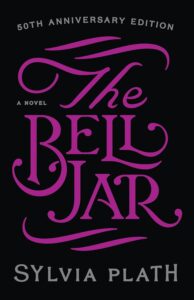
The story follows college student Esther Greenwood through her internship, near suicide and recovery in a 1950s mental hospital. It’s normally read as a critique of the social dynamics of the patriarchy, but it can be appreciated for a single quote that lays out the dilemma we all face: How do we choose the right path?
“I saw my life branching out before me like the green fig tree in the story…. One fig was a husband and a happy home and children, and another fig was a famous poet and another fig was a brilliant professor…. I saw myself sitting in the crotch of this fig tree, starving to death, just because I couldn’t make up my mind which of the figs I would choose.”
What does this teach? Decisiveness. The universe offers an infinite number of opportunities, but also opportunity costs. To be effective, just choose your figs already.
Key takeaways:
- Societal expectations can cause disillusionment.
- Opportunities that present themselves are options and not requirements.
Buy this book on Amazon.
Self-Improvement Books for Building Relationships
Too many entrepreneurs try to build businesses by obsessing over data from behind a laptop. They forget that the fastest way to succeed is to create powerful relationships. Ditch the five-step formula someone is trying to sell you, and try these human-centered strategies instead.
15. The Prosperous Coach
By Steve Chandler and Rich Litvin
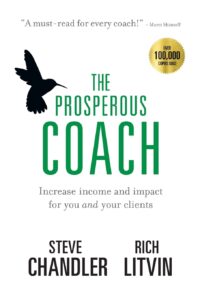
This is a niche book about how to make money as a life coach, but the lessons apply to anyone who is trying to build a client list. The authors’ advice mocks the Silicon Valley startup approach, but it works.
Their prescription? No cold calling, no website or marketing, no business cards or networking events. The best way to create a client is to have powerful, face-to-face conversations. Any time spent outside of these conversations is not effective, they say.
In a world that worships click funnels and Instagram accounts, this alternative, human-centered marketing strategy might just set you apart from the competition.
Key takeaways:
- Build connections with face-to-face interactions.
- Show your value in all the work you deliver.
Buy this book on Amazon.
16. This Is Marketing
By Seth Godin
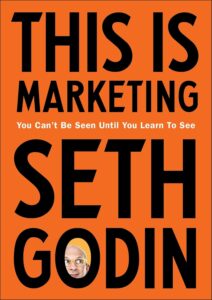
Seth Godin is a particularly effective marketer because he knows that marketing is not about “getting the word out,” but about serving others. Marketing has a bad rap because many ad agencies think that he who shouts the loudest, wins.
Instead, marketing can be used as a synonym for helping others solve problems—preferably a carefully curated tribe of people who you connect with in a genuine way. If your Facebook ads aren’t delivering the ROI you expect, read this book to find out why.
Key takeaways:
- Solving someone’s problem will make them want to help you in return.
- Building trust is an integral step in relationship building.
Buy this book on Amazon.
17. Never Split the Difference
By Chris Voss and Tahl Raz
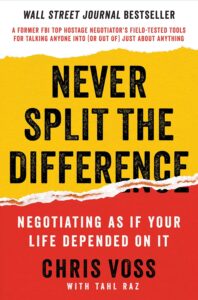
Sooner or later, every entrepreneur discovers that negotiation is an indispensable skill. Traditional books and business school wisdom take great pains to show us exactly how humans are rational, calculating machines designed to maximize our interests.
But we’re not.
Humans are a messy bundle of emotions, biases and quirks, and this book argues that emotion is the biggest ingredient in any back-and-forth. The person who can be the most empathetic, the best listener and create a deep connection can best judge their adversary’s desires and get what they themselves want.
Key takeaways:
- Seek an understanding of your counterpart to influence the negotiation process.
- Mirroring and active listening can foster rapport.
Buy this book on Amazon.
Self-Improvement Books About Productivity
What’s the most precious asset in your work and business? You are! When you learn to coax the best from yourself, success is assured.
18. Slow Productivity: The Lost Art of Accomplishment Without Burnout
By Cal Newport
Hustle culture dominates the workforce these days, with many workers feeling like they must be constantly busy to feel successful in their work lives. This self-help book looks into why this might be and how avoiding the feeling of overwhelm can lead to a happier work-life balance.
Newport lays out the theory of “slow productivity” as a more sustainable method of achievement in the work environment. It’s not about how much work we do but the quality of the work itself.
Key takeaways:
- Focus on quality and not quantity.
- Much of what we do is just to “look busy” and can be eliminated.
Buy this book on Amazon.
19. Languishing: How to Feel Alive Again in a World That Wears Us Down
By Corey Keyes
Languishing, or “a sense of low-grade mental weariness,” is pervasive, especially in a post-COVID world. It can lead us to lose our sense of joy for things that used to bring us pleasure and cause us to lose motivation.
In this self-help book, Keyes lays out factors that combat languishing and lead us to flourish, such as connection to community and acceptance by others. He provides the framework for taking small steps on a daily basis to create meaning and connection in our lives.
Key takeaways:
- An ongoing motivation to master new tasks helps us to feel successful.
- Accepting ourselves as we are can help us motivate ourselves to change.
Buy this book on Amazon.
21. The Happiness Equation
By Neil Pasricha
1000 Awesome Things blogger Neil Pasricha went on to write a self-help book intent on answering the question, “What makes a happy life?” The book is packed with happy advice, but one simple diagram stands out for its pure, simplistic genius. It’s a 2×2 table that shows we can operate in four modes: thinking, doing, resting and burning.
Most of us live in the Burn Box, always striving to cross one more task off our list. This constant hyperactivity is a recipe for burnout, and Pasricha shows that productivity is maximized by alternating between modes of being.
Key takeaways:
- External validation and material possessions will not help you achieve happiness.
- Focus on what you already have.
- Live life in the present instead of focusing on the past.
Buy this book on Amazon.
22. The E-Myth Revisited
By Michael E. Gerber
We would all love to quit our 9-5 jobs to open our own bar, bakery or consulting gig so we can do what we love all day. So why do 90% of small businesses fail in the first few years? It’s because most new entrepreneurs don’t end up doing what they love. They instead spend their waking hours on payroll, bookkeeping and clogged toilets instead of making those artisanal flourless cupcakes.
The E-Myth Revisited begs entrepreneurs to work “on” your business instead of “in” your business. That means setting up reliable systems as soon as possible that will allow the company to function without you. Fail at this, and you’ve just traded one job for another—with many more headaches.
Key takeaways:
- Entrepreneurs get bogged down in the day-to-day work of running a business instead of getting it to thrive.
- Setting up systems that allow the business to run without you will enable you to pursue your goals.
Buy this book on Amazon.
Best Self-Improvement Books About Minimalism
Did you get the memo? We’re all supposed to work tirelessly for 50 years so we can fill our too-big houses with toys we don’t have time to use because we’re busy raising overachievers who will repeat the cycle, all to serve the god of endless economic growth. Or, you can opt-out.
Minimalism, slowness and the benefits of having less are themes throughout the following self-help books.
23. In Praise of Slowness
By Carl Honore
There is a tranquil minority walking among us who stress less but live more. These are the advocates of the slow movement. They say no to cubicle lunches, four-minute book summaries, “multitasking” (whatever the heck that means) and monochrome, microwave dinners.
But they are not always slow. They follow what musicians call the “tempo giusto,” or the right speed for the occasion. They have a turbo setting, but they don’t leave it engaged. Yes, you can enjoy life while producing great work—if you slow down.
Key takeaways:
- Ditch multitasking in favor of focusing on one thing at a time.
- Rushing means we fail to create a connection.
Buy this book on Amazon.
24. Essentialism
By Greg McKeown
This is an unassuming book that will forevermore live on your bookshelf. What’s the Essentialist mantra? “Less, but better.” Greg McKeown shows that when we distinguish between the “vital few” and the “trivial many,” then focus only on the vital, massive results will follow, including spiked productivity, a reputation for getting things done, work promotions and tranquility (80/20 rule, much?).
What poisons our productivity is an insistence on doing and having everything. When we become an Essentialist, we let go of that fantasy and discover that practically everything we were doing was unimportant.
Key takeaways:
- Saying no to invitations lets you say yes to your personal goals.
- Challenge the idea of “more is better.”
- You can have more impact when you limit yourself.
Buy this book on Amazon.
25. The Life-Changing Magic of Tidying
By Marie Kondo
What does purging old sweatpants have to do with becoming a better person? The author says it best: “The question of what you want to own is actually the question of how you want to live your life.”
You’ve heard the dictum that “how you do anything is how you do everything,” and it’s true: The micro always creates the macro. If your personal space is cluttered, your life and mind will be, too.
In Marie Kondo’s method, you only declutter once. When you experience the true peace and clarity of living lighter, you’ll never revert to your hoarding ways.
Key takeaways:
- Things have a purpose for a time, but they don’t have to stay with us forever.
- Attachment to things that no longer serve a purpose holds us back.
Buy this book on Amazon.
Self-Improvement Books for Finding Perspective
Losing sight of what’s important happens almost automatically. Great work iLosing sight of what’s important happens almost automatically. Great work is almost never urgent work, and so we get swept away by the ringing phone, the jerk in traffic, the overdue phone bill. If we’re not careful, the attention thieves will lead us straight to the grave before we’re aware it’s happening.
These self-help books help us to live in the present moment and focus on what we can control.
26. The Let Them Theory
By Mel Robbins
Do other people’s opinions of you weigh you down? This self-help book says: “Let them.” Those two words will free you by teaching you that you cannot control other people; you can only control yourself. Let others think and do as they will, as it does not impact you.
Creating a personal boundary lets you work on yourself without external influences bringing you down. You give up trying to control things out of your control and instead look to how you can change the situation with actions you do control.
Key takeaways:
- We cannot control others. Trying to do so only leads to frustration.
- When we let others have their own opinions, we turn the focus to what we can control.
Buy this book on Amazon.
27. Wherever You Go, There You Are
By Jon Kabat-Zinn
Jon Kabat-Zinn has spent his entire career as a professor studying mindfulness and the science behind it. After a lifetime of this, he’s picked up some powerful perspective-granting tools.
You can read this classic book for five minutes at a time. Its short chapters teach you the value of standing in a doorway to watch the sunset, how to react when your family leaves dirty dishes in the sink (again) and how to spot your mind’s incessant judgments and let them go.
When you find yourself frustrated or anxious, this book’s simple lessons can help you regain your footing.
Key takeaways:
- Anchoring yourself to the present moment leads to personal change.
- Regular meditation and mindfulness will help guide decision-making.
Buy this book on Amazon.
28. Don’t Sweat the Small Stuff… and It’s All Small Stuff
By Richard Carlson
This book was published in 135 countries in 26 languages. It spent 101 weeks on the bestseller list… and it’s about the size of a coaster. But wisdom doesn’t need volumes to contain it. Like Kabat-Zinn’s book above, this is one you can pick up when you catch yourself complaining that your co-worker used the old TPS cover sheet on their report or that the barista used skim milk instead of 1%. It’s the perfect book for a beginner looking to delve into the self-help world.
In a world that prioritizes which vapid celebrity said what on social media and getting a good deal at Costco, we all need a regular dose of perspective. That’s what every page of Richard Carlson’s self-improvement book delivers.
Key takeaways:
- Trust your intuition.
- Live each day as if it might be your last.
Buy this book on Amazon.
The Real Deal
Sometimes taking the first step is the hardest. This list of self-help books is full of options, whether you want to work on your personal mindset or give up the stress of being busy all the time. Pick a book and take the first step at bettering your life by removing obstacles, ignoring outside voices that bring you down and focusing on what is important. You’ll be one step closer to achieving your work and life goals.
This article was published in March 2020 and has been updated. Photo by Dejan Dundjerski/Shutterstock




